Recent updates from LMS Publications
- Excellent papers published by the LMS
-
The Managing Editors of 6 journals have selected 6 articles published by the LMS between 2020 and 2023 that make substantial progress on conjectures and problems across a range of mathematical topics and disciplines.
This collection represents some of the best work published in the Society’s journals. View it here.
- Bulletin and Journal of the LMS launch new peer review workflow
-
The Bulletin and Journal of the LMS have launched a new workflow with a reorganised Editorial Board. The peer review now takes place within 7 subject-focused Sections, each presided over by a Section Editor who has the authority to accept papers. This contrasts with the old workflow where the Managing Editors made the final decisions.
There were many reasons for this change, but most importantly, it made sense to bring the decisions closer to where the specialist expertise resides, so that the journals are better able to make quick, fair decisions.
The journals are now proud to welcome also papers of specialist interest, provided that there is there is a well-written introduction that sets the research in a context that a wider community of mathematicians can understand. They complement the general-interest papers that the journals are already well known for. We encourage you to consider the Bulletin and Journal as destinations for your research. To submit your paper, go to lms.ac.uk/blms (Bulletin) or lms.ac.uk/jlms (Journal).
The size of the Editorial Board has increased to accommodate these changes. The role of the Managing Editors has also changed. In the past, the Managing Editors have performed heroic feats in handling very large (and growing) numbers of papers. Going forward, this task is divided between 7 different Section Editors; the role of the Managing Editors is to oversee and ensure quality and balance between the different subject areas.
The LMS is both excited and pleased to have completed these changes to the workflow and the Editorial Board, and is looking forward with anticipation to the outcome, which should be a noticeable improvement for authors and in the way their submissions are progressed.
- New Managing Editors for the Journal and the Journal of Topology
-
The LMS is pleased to welcome Caroline Series FRS (University of Warwick) and Stuart White (University of Oxford) as new Managing Editors of the Journal of the LMS, as well as John Greenlees (University of Warwick) as the new Managing Editor of the Journal of Topology.
Caroline and Stuart replace Mark Haskins and James Maynard FRS who have led the Journal since 2018/2019.
John replaces Ivan Smith FRS who has been Managing Editor 2021–2023 and was prior to that on the Editorial Board of the Journal of Topology since 2012.The LMS wishes to express its gratitude to Mark Haskins, James Maynard and Ivan Smith for their excellent service to the journals and the Society.
- LMS Transactions Gains Impact Factor of 0.8
-
The Transactions of the London Mathematical Society has received a 2-year Journal Impact Factor of 0.8 and a 5-year Journal Impact Factor of 0.8 in the Journals Citation Reports for 2022 released by Clarivate on 28 June 2023.
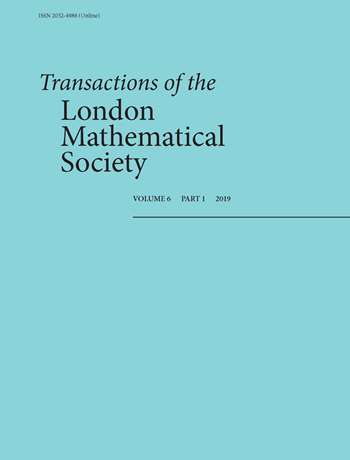
The 2-year Journal Impact Factor is the average number of citations in 2022 to papers published in 2020 and 2021. The 5-year Journal Impact Factor is the average number of citations in 2022 to papers published in the years 2017–2021. For the first time, impact factors are reported only to one decimal place.
The Transactions was founded in 2014 by the London Mathematical Society as a fully Open Access journal and has an eminent Editorial Board with worldwide coverage. It publishes articles of the highest quality across the full range of mathematics, with an emphasis on excellent exposition of research which explores the interconnectedness of pure mathematics or extends the boundaries of its applicability. The Transactions welcomes high-quality submissions.
The journal impact factor is only one amongst a variety of publication metrics. The Transactions has a Journal Citation Indicator of 0.59 and a CiteScore of 0.5. As an early signatory of the Declaration on Research Assessment (DORA), the LMS discourages any use of journal metrics as an indicator of the quality of individual articles or, by extension, of the academic standing of their authors or those authors' institutions.
- Moduli – An Editorial
-
As the Managing Editors, we are pleased to introduce you to Moduli, a new open access mathematics journal owned by the Foundation Compositio Mathematica and published in collaboration with the LMS and Cambridge University Press.
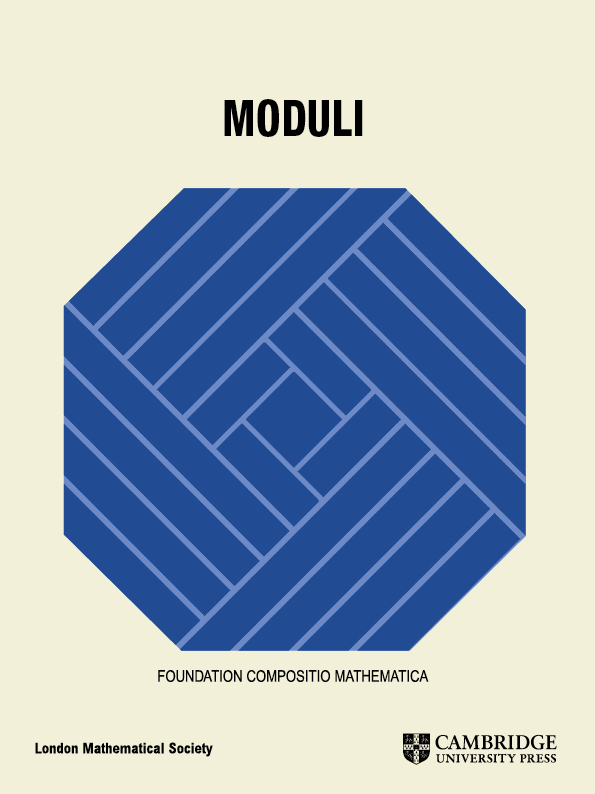
Our goal with Moduli is to create a common forum, to bring researchers from different corners of mathematics together and build a community around the common theme of moduli theory. The journal will facilitate communications across disciplines in a way which subject specific journals might miss. To promote this community-building, the managing editors of Moduli also plan to organize a series of events loosely affiliated with the journal. The first such event will be the three-week Summer Workshop in Mathematics taking place on 1–19 July 2024 at the Simons Center for Geometry and Physics (Stony Brook, NY), which will be dedicated to Moduli.
The question “There really is no journal dedicated to moduli theory – why don't we create one?” was posed by one of us (Jørgen) to the steering committee for the Vector Bundles on Algebraic Curves (VBAC) group as we were discussing how to cope with retirement of the group's founder and long-time leader, Peter Newstead. Created in the early 1990s, this group has met for an annual workshop every year with just one small gap in 1995/1996 and one COVID hiatus in 2021. These annual gatherings anchored and inspired more than one generation of researchers in a broad range of topics. After guiding the group for over thirty years, Peter retired from his active leadership in 2021. While we discussed Peter’s legacy, and life in VBAC without him at the helm, we reflected on how valuable it has been to have a community built around this corner of moduli theory. That is when we realized the potential for an even wider, interdisciplinary community, united around moduli theory more broadly.
Four members of the VBAC steering committee were joined by three other researchers in moduli theory to form the founding managing editorial board. We pitched the idea to the Foundation Compositio Mathematica, and Moduli was born. The new journal welcomes original research contributions of the highest quality on all aspects of moduli, and emphasizes clarity of exposition to enable all papers to bridge as many boundaries as possible within the target audience.
We encourage you and the entire mathematical community to participate in this exciting new venture by submitting high-quality papers in the broad area of moduli spaces and their theory to Moduli. We look forward to your submissions (see our website at https://moduli.nl/ for more information).
Best wishes,
Jørgen Ellegaard Andersen, Steve Bradlow, Dan Halpern-Leistner, Vicky Hoskins, Frances Kirwan, Margarida Melo, and Anna Wienhard
- Launch of Moduli
-
We are delighted to announce the launch of Moduli, a new open access journal owned by the Foundation Compositio Mathematica and published in collaboration with the LMS and CUP.
Now open to submissions, Moduli will provide a unified forum for significant new results on all aspects of moduli theory or related mathematics, including but not restricted to techniques from: algebraic, differential and arithmetic geometry; combinatorics; dynamical systems; gauge theory; geometric analysis; geometric group theory; pure mathematics inspired by physics; representation theory; and topology. To submit your paper, visit https://moduli.nl.
The journal is led by a team of Managing Editors, supported by an Editorial Board of world-renowned researchers.
The Managing Editors are:
Jørgen Ellegaard Andersen, University of Southern Denmark, Denmark Steve Bradlow, University of Illinois Urbana-Champaign, USA Dan Halpern-Leistner, Cornell University, USA Vicky Hoskins, Radboud Universiteit Nijmegen, The Netherlands Frances Kirwan, University of Oxford, UKFor more information on Moduli, please see: https://lms.ac.uk/publications/moduli
The Foundation Compositio Mathematica also owns two other journals: Compositio Mathematica and Algebraic Geometry.
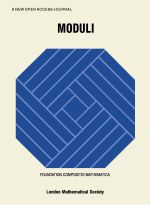
- Margarida Melo, Università di Roma Tre, Italy
- Anna Wienhard, Max Planck Institute for Mathematics in the Sciences, Germany
- Congratulations to JLMS Managing Editor James Maynard on his 2022 Fields Medal
-
James Maynard was awarded a Fields Medal for contributions to analytic number theory, which have led to major advances in the understanding of the structure of prime numbers and in Diophantine approximation.
5 July 2022
- 2022 Senior Berwick Prize awarded to John Greenlees and Brooke Shipley
-
Professors John Greenlees (Warwick University) and Brooke Shipley (University of Illinois
Chicago) are awarded the Senior Berwick Prize for their paper ‘An algebraic model for
rational torus-equivariant spectra’, published in the Journal of Topology in 2018.1 July 2022
- Compositio prize for the period 2017-2019
-
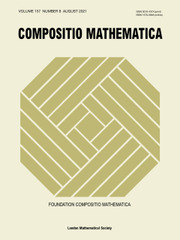 The prize for the period 2017-2019 has been awarded to two papers
The prize for the period 2017-2019 has been awarded to two papersDaniel Huybrechts: The K3 category of a cubic fourfold.
Compositio Mathematica 153 (2017), pp 586-620.Colin J. Bushnell and Guy Henniart: Local Langlands correspondence and ramification for Carayol representations.
Compositio Mathematica 155 (2019), pp 1959–2038.The Compositio Prize is a prize awarded every third year by the Foundation Compositio Mathematica in recognition of an outstanding piece of mathematical research that is published in the Compositio Mathematica journal. Previous prizewinners are listed here: https://compositio.nl/#prize
- 2021 Berwick Prize awarded to Dr Ailsa Keating
-
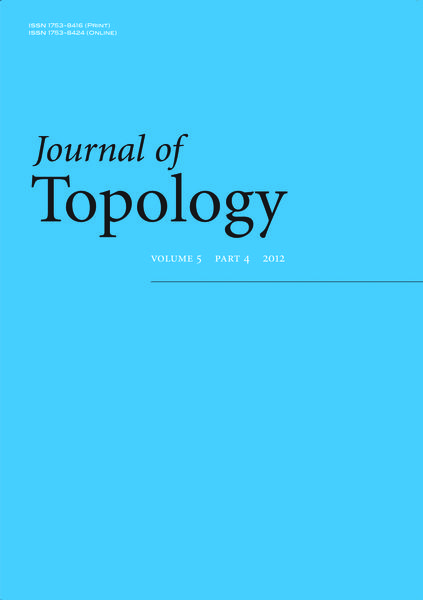 Dr Ailsa Keating of the University of Cambridge is awarded a Berwick Prize for the paper ‘Dehn twists and free subgroups of symplectic mapping class groups’, published in the Journal of Topology. Keating's work sheds light on the global symmetries of symplectic manifolds, by showing that arbitrary products of Dehn twists along two Lagrangian spheres that intersect at least twice never simplify to the identity map.
Dr Ailsa Keating of the University of Cambridge is awarded a Berwick Prize for the paper ‘Dehn twists and free subgroups of symplectic mapping class groups’, published in the Journal of Topology. Keating's work sheds light on the global symmetries of symplectic manifolds, by showing that arbitrary products of Dehn twists along two Lagrangian spheres that intersect at least twice never simplify to the identity map. See the full citation here.
See all 2021 LMS prize winners here.
A list of historical prize winners can be found here.
- 2020 Gavin Brown Prize (AustMS) awarded for 2010 Bulletin article
-
Every flock generalised quadrangle has a hemisystem published in the Bulletin of the London Mathematical Society.
The Australian Mathematical Society awards the Gavin Brown Prize to John Bamberg, Michael Giudici and Gordon F. Royle for the paper
The Gavin Brown Prize is a “best paper” prize awarded annually by the Australian Mathematical Society, for work in any field of mathematics published no more than 10 years before the award.
The full citation can be found here.
- 2020 Senior Berwick Prize awarded to Professor Thomas Hales
-
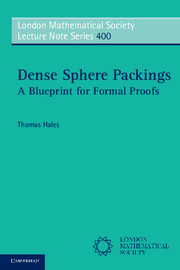 Professor Thomas Hales of the University of Pittsburgh is awarded the Senior Berwick Prize in recognition of his book ‘Dense sphere packings. A blueprint for formal proofs’ (London Mathematical Society Lecture Note Series, 400. Cambridge University Press, Cambridge.2012. xiv+271 pp. ISBN: 978-0-521-61770-3).
Professor Thomas Hales of the University of Pittsburgh is awarded the Senior Berwick Prize in recognition of his book ‘Dense sphere packings. A blueprint for formal proofs’ (London Mathematical Society Lecture Note Series, 400. Cambridge University Press, Cambridge.2012. xiv+271 pp. ISBN: 978-0-521-61770-3).26 June 2020
- UK authors: arrangement between Wiley and Jisc to make papers open access
-
Authors affiliated with over 140 institutions in the UK may now opt to publish their papers open access, under a CC-BY licence, at no direct cost to themselves.
This arrangment between Jisc and Wiley covers research and review papers accepted for the Bulletin, Journal, Proceedings, Transactions, Journal of Topology and Mathematika.
The article's corresponding author must be from a participating UK institution (see the Wiley Institutional & Funder Payments page) and the article must have been accepted on or after 2 March 2020.
5 March 2020
- 2019 Berwick Prize awarded to Dr Clark Barwick
 Dr Clark Barwick of the University of Edinburgh is awarded a Berwick Prize for his paper 'On the algebraic K-theory of higher categories', published in the Journal of Topology in 2016, which proves that Waldhausen's algebraic K-theory is the universal homology theory for ∞-categories, and uses this universality to reprove the major fundamental theorems of the subject in this new context.
Dr Clark Barwick of the University of Edinburgh is awarded a Berwick Prize for his paper 'On the algebraic K-theory of higher categories', published in the Journal of Topology in 2016, which proves that Waldhausen's algebraic K-theory is the universal homology theory for ∞-categories, and uses this universality to reprove the major fundamental theorems of the subject in this new context.See all 2019 LMS prize winners here.
A list of historical prize winners can be found here.
July 2019
- The LMS becomes a signatory to DORA
-
 The London Mathematical Society has signed the San Francisco Declaration on Research Assessment (DORA) in support of the movement towards the responsible use of research metrics within mathematics.
The London Mathematical Society has signed the San Francisco Declaration on Research Assessment (DORA) in support of the movement towards the responsible use of research metrics within mathematics.DORA is a worldwide initiative covering all scholarly disciplines which recognizes the need to improve the ways in which the outputs of scholarly research are evaluated and seeks to develop and promote best practice. To date it has been signed by over 1,200 organizations and around 13,000 individuals. Its main themes are the need to eliminate the use of journal-based metrics, such as Journal Impact Factors, in funding, appointment, and promotion considerations; the need to assess research on its own merits rather than on the basis of the journal in which the research is published, and exploring new indicators of significance and impact.
11 March 2019
- New Identity for the Proceedings
-
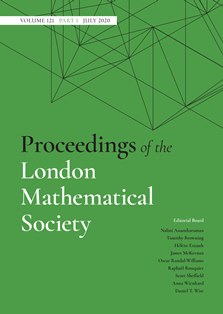 As of 1 March 2019, the Proceedings of the LMS has been relaunched with its own Editorial Board and new criteria for acceptance.
As of 1 March 2019, the Proceedings of the LMS has been relaunched with its own Editorial Board and new criteria for acceptance. Statement from the Managing Editors
1 March 2019
- Compositio Mathematica Prize awarded to Professor James Maynard
-
T
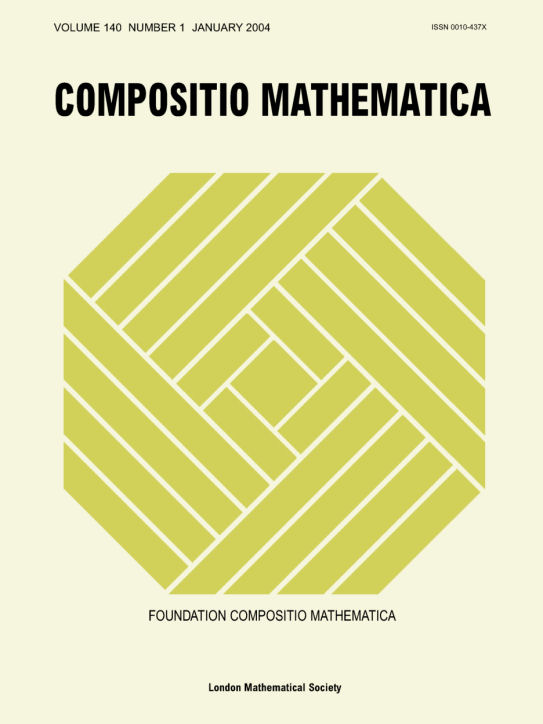 he Prize for the best paper published in Compositio Mathematica in the three-year period 2014–2016 has been awarded to the paper 'Dense clusters of primes in subsets' by James Maynard (Compos. Math. 152 (2016) 1517–1554). More information is can be found here.
he Prize for the best paper published in Compositio Mathematica in the three-year period 2014–2016 has been awarded to the paper 'Dense clusters of primes in subsets' by James Maynard (Compos. Math. 152 (2016) 1517–1554). More information is can be found here.22 November 2018
- 2018 Senior Berwick Prize awarded to Professor Dr Marc Levine
-
 Professor Dr Marc Levine of the University of Duisburg-Essen is awarded a Senior Berwick Prize in recognition of his paper: “A comparison of motivic and classical stable homotopy theories”, J. Topol. 7 (2014), no.2, 327–362.
Professor Dr Marc Levine of the University of Duisburg-Essen is awarded a Senior Berwick Prize in recognition of his paper: “A comparison of motivic and classical stable homotopy theories”, J. Topol. 7 (2014), no.2, 327–362.A list of historical prize winners can be found here.
- Transactions of the LMS now listed in the Emerging Sources Citation Index
-
 Launched in 2013 and published by Wiley on behalf of the LMS, the Transactions of the LMS is the Society’s fully open access, online journal. In April 2018, the journal was accepted into Clarivate Analytics’ Emerging Sources Citation Index (ESCI).
Launched in 2013 and published by Wiley on behalf of the LMS, the Transactions of the LMS is the Society’s fully open access, online journal. In April 2018, the journal was accepted into Clarivate Analytics’ Emerging Sources Citation Index (ESCI).Launched by Clarivate in 2017, ESCI is a multidisciplinary index that includes journals which have passed an editorial evaluation. While being covered in ESCI, journals will continue to be considered for inclusion in other Web of Science Core Collection indexes, such as the Science Citation Index Expanded (SCIE).
All content published in Transactions of the LMS can be accessed for free online at http://bit.ly/TLMSlms
17 April 2018
- Special issue of Mathematika, dedicated to Klaus Friedrich Roth
-
The Editors of Mathematika are pleased to announce a special issue of the journal dedicated to Klaus Friedrich Roth, which is now available on Cambridge Core. Read a blog entry from the Managing Editor of Mathematika, Alex Sobolev, detailing the project for which William Chen and Robert Vaughan acted as special editors.
30 November 2017
- Mandating ORCID
-
ORCID (Open Researcher and Contributor ID) is a not-for-profit organisation that provides unique identifiers for researchers engaged in academic publishing and scholarship. An ORCID iD distinguishes researchers from others, simplifies the searching of databases and indexes, and supports manuscript submissions and grant applications. As such it saves time, connects researchers with funders, societies and other institutions, and creates a persistent thread to link research activities. The LMS is joining many other academic publishers and funding bodies in making ORCID iDs required as part of the submission process to its journals.
From 2020, ORCID iDs will be mandatory for all corresponding authors submitting a paper to the Bulletin, Journal, Proceedings and Transactions of the London Mathematical Society, and to the Journal of Topology. Corresponding authors will be asked to provide their ORCID iD as part of the submission process; those without an ORCID ID will be shown how to obtain one. This can be done in just a minute or two via the website https://orcid.org.
1 November 2017
- Transactions of the LMS now listed in the Directory of Open Access Journals
-
Launched in 2013 and published by Wiley on behalf of the LMS, the Transactions of the LMS is the Society’s fully open access, online journal. As of July 2017, the journal has been listed in the Directory of Open Access Journals (DOAJ).
DOAJ is an independent, community-curated online directory that indexes and provides access to quality open access, peer-reviewed journals. Currently containing the information of over 9,000 publications, DOAJ aims to increase the ease of use of those open access academic journals that adhere to criteria for quality control and best practice.
All content published in Transactions of the LMS can be accessed for free online at http://bit.ly/TLMSlms. Inclusion in DOAJ signifies Transactions of the LMS as a quality open access journal, and increases the visibility and impact of the mathematical papers that it publishes.
12 July 2017
- Content sharing: new peer-to-peer feature launched by Wiley
-
As of July 2017, subscribers of the Bulletin, Journal and Proceedings of the LMS, and the Journal of Topology, are able to share content with each other in a new way.
Our publishing partner Wiley has introduced a ‘peer-to-peer’ sharing initiative on their Online Library, where articles published in these journals are accessed digitally. Subscribers (with existing full-text access to the journals) can generate a URL that can be shared with other readers in the form of an ePDF provided by academic paper manager ReadCube,
When shared with a fellow subscriber, the URL provides an unrestricted view of the electronic PDF and the usual ability to download or print it; a non-subscriber is granted restricted access to a read-only PDF with no print or download privileges.
This new way to share articles should benefit researchers, institutions and society as a whole, facilitating collaboration and hopefully achieving a wider readership and impact of research.
12 July 2017


